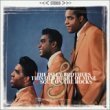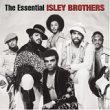|
Biography on the Isley Brothers -
|
Music elements weren't the first things they shuffled around. The Cincinnati, Ohio natives formed a gospel group in their youth. Vernon, Rudolph, Ronald, and O'Kelly got early support from their parents, a church pianist and a professional singer.
When a bike accident killed Vernon in 1955, tenor Ronald took over as the lead.
Two years later, recording opportunities in New York City beckoned. The Isleys answered the call. Alas, their doo-wop singles bombed, flopped, and failed, no matter what label they tried.
They found better luck in Washington, D.C. During a live performance of Jackie Wilson's "Lonely Teardrops," the Isleys just happened to insert a rabble-rousing remark. The audience just happened to lap it up. An RCA executive who just happened to be there took notice.
 |
At Wand, the Isleys kicked up another hit in 1962 with the Top Notes original "Twist and Shout." As well as it did, they'd get to watch the Beatles do even better with that song. Same with other white artists for some Isley-penned tunes like "Respectable" and "Nobody but Me."
While the public overlooked them, the Isleys sharpened their singing and writing skills on their own T-Neck (i.e., Teaneck, New Jersey) label.
They also zeroed in on others' gifts. In 1964, they hired a guitarist who would burn up "Testify," influence a future member's licks, and stun listeners with his spacey cyclones of sound. The Isleys knew him as Jimmy James. The world would use the name Jimi Hendrix.
When the future of black pop seemed brightest at Motown, the singers joined its Tamla label in 1965. The Isley Brothers' "This Old Heart of Mine (is Weak for You)" reached the Top 20. But nothing else by Holland-Dozier-Holland came close.
In 1967, the group pinned its hopes for a rebound on England. Isley mania was a wee bit stronger there, so the Brothers shipped themselves overseas.
1969 marked another decisive moment. The fiercer R&B of Isley Brothers songs had sometimes clashed with Motown's poppier preferences. Artistically and commercially, they felt unsatisfied. Motown had increased their celebrity by association...maybe that was all they needed...
 |
Upon returning to the U.S., the singers snipped their Motown ties.
Pouring energy into dormant T-Neck, they extended their own discography. They soon came up with "It's Your Thing," a #2 hit that also earned a Grammy. Looks like they made the right career move!
Yet it was no time to settle down. Two younger Isleys (guitarist Ernie and bassist Marvin), an Isley brother-in-law (keyboardist Chris Jasper), and an Isley ally (Everett Collins) created a backup band. All together, they produced a forceful, fluid tone that planted these churched soulsters in funk and edged them toward rock.
In the '70s, they applied their new sound to existing (white!) songs like Bob Dylan's "Lay Lady Lay," Stephen Stills's "Love the One You're With," and Carole King's "It's Too Late." They even raided their own albums: "Who's That Lady," the artists' 1964 dud, morphed into the seductive smash "That Lady, Pt. 1" in 1973.
Matters of the heart weren't their only concerns. "Fight the Power, Pt. 1" and the cover combo "Ohio/Machine Gun" sizzled with political fury.
When disco fever wracked the public, the singers fiddled with their music again. They churned out body-shakers like "The Pride" and "I Wanna Be With You, Pt. 1." With more satiny songs like "Between the Sheets," the group swept fans off their feet. ;)
In the 1980s, the Isleys could no longer Go All the Way commercially. In 1984, following years of wilting album sales, Ernie, Marvin, and Chris Jasper formed a separate band called Isley/Jasper/Isley.
One of the older brothers, O'Kelly, died of a heart attack in 1986. The original trio was no more.
Over two decades later, on June 7, 2010, Marvin Isley passed away at age 56.
But the Isley Brothers aren't history yet.
Between ministry-bound Rudolph and mainstay Ronald, the performers continued as a duo or on their own. Reunions, induction into the Rock and Roll Hall of Fame, and collaborations with other artists in the '90s have kept the flame alive. Not even Ronald's stroke in 2004 has snuffed out his gusto.
No matter how often they tweaked their music, the Isley Brothers stayed put on the R&B charts, scoring at least 50 times since 1969. Figure in their early efforts, and you've got one of the most consistent and multitalented groups in pop music--let alone black music.
Although their Motown stint didn't work out, they've sure done their alma mater proud.
All these Isley Brothers not enough for your R&B soul? Head home to try some more Motown oldies singers!